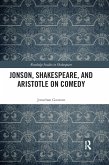Through his study of the adaptations, Biberman pinpoints aspects of behavior and psychology that no longer ring true because circumstances have changed so dramatically between Shakespeare's time and the time of the adaptation. He shows how the adaptive changes reveal key differences between Shakespeare's culture and the culture that then supplanted it. These changes, once grasped, reveal retroactively some of the ways in which Shakespeare's characters do not act and think as we might expect them to act and think. Thus Biberman counters Harold Bloom's well-known claim that Shakespeare fundamentally invents our sense of the human; rather, Biberman argues, our sense of the human is equally bound up in the many ways that modern culture has come to resist or outright reject the behavior we see in Shakespeare's plays. To illustrate the far reaching implications of this provocative and ground-breaking claim, Biberman includes in-depth analysis of the stage history of many of Shakespeare's most important plays, including Antony and Cleopatra, Cardenio, Coriolanus, Hamlet, King Lear, Macbeth, Measure for Measure, Much Ado About Nothing, Romeo and Juliet and The Tempest. Ultimately, Biberman's timely study argues persuasively that our current sense of 'the human' is bound up not with the adoption of Shakespeare's psychology, but rather its adaption-or, in psychoanalytic terms, its repression and replacement.
Hinweis: Dieser Artikel kann nur an eine deutsche Lieferadresse ausgeliefert werden.
Hinweis: Dieser Artikel kann nur an eine deutsche Lieferadresse ausgeliefert werden.








